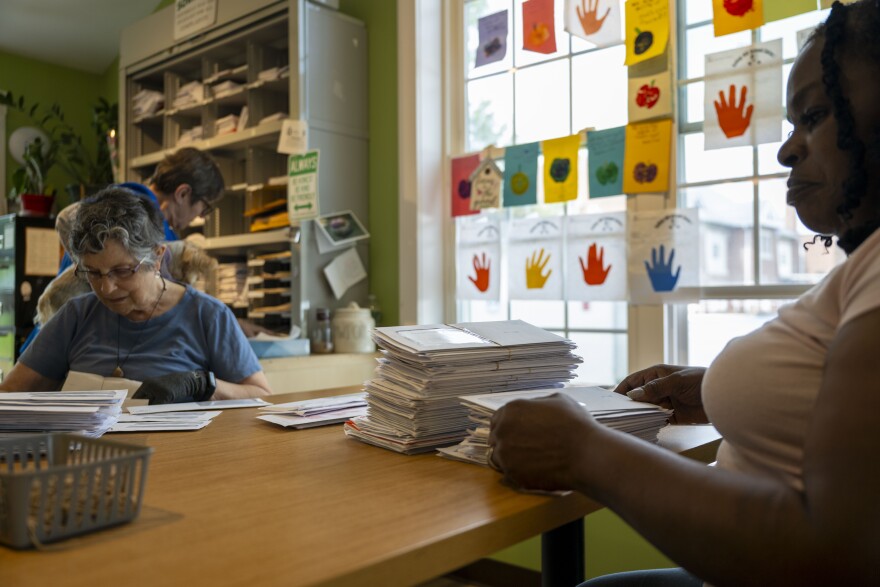Jose Colon, is an outreach coordinator with the New London Homeless Hospitality Center.
Colon’s job is to drive the streets of New London, offering aid to people who are homeless.
He sat on the center’s shaded patio where he could hear the sound of traffic along I-95 in the distance, while reflecting on the many ways he assists those who are unhoused.
“I'm able to provide them with showers, laundry vouchers, bus passes, gas cards for people that are staying in their cars, insurance, registration, car repair, flats, train tickets,” Colon said.
While working, he wears a reflective yellow vest with the words “Homeless Outreach Team” on the back. His lanyard carries a work ID with a picture of him smiling and an unopened dose of Narcan he can administer in case he encounters someone overdosing on opioids.
Colon has worked at the center for three years, and in that time he said he’s helped house about 200 people. About 5% return to the shelter, but the majority stay housed, according to Colon.
Colon once battled drug addiction and homelessness. Sharing his story with the people he tries to assist is what helps gain their trust, he said.
“I got out of drugs. I got out of homelessness. I got out of violence,” Colon said. “I tell them where I come from, where I've been, and they open up to me immediately.”
Changes in CT’s homelessness response

Annually, about 600 people seek help from New London Homeless Hospitality Center. Since 2021, Connecticut’s had a 30% increase in homelessness, caused by multiple factors, including rising rent and inflation.
It can be difficult to remain optimistic about the center’s work, Executive Director Catherine Zall said.
“I'm sad in a way today that I never was before,” Zall said. “But what else is there to do but to get up every day. You see the suffering around you, I have some capacity to do something about it, and so, in a strange way for me, it's like a blessing, right?”
Connecticut’s constrained housing market was ranked the worst in the nation, according to a recent study, commissioned by the state legislature.
Only a third of extremely low-income families in Connecticut can access affordable rental properties.
The way Connecticut has handled the state’s homelessness crisis has improved, and is the biggest change over the Center’s 20 year history, Zall said.
When the Center was created in 2005, unhoused individuals had to make calls to find a shelter that would take them in.
“You had to call, and maybe somebody answered. Maybe they didn't. Maybe you had a phone, maybe you didn't. Maybe you knew the number, maybe you didn't. Just really, no organized system,” Zall said.
More than a shelter

The center is one of the only in the state to provide housing and care for individuals experiencing homelessness who were recently released from local hospitals.
For the last decade, the center has partnered with Yale New Haven Health to bring nearby clients to the shelter when they are ready to be discharged. The hospital also provides additional support and services for those clients.
“Spending a lot of money to get somebody healthy in the hospital and then discharging them to the streets or to a shelter where their needs can't be met, it just doesn't make sense,” Zall said.
In some instances, lack of housing prevents patients from being discharged, ultimately delaying their recuperation.
The help center, located on the first floor of the shelter dorms, provides medical care, connects clients to employment opportunities and acts as a mailing address.
The center also helps clients track down their birth certificate or secure a new driver’s license for free.
The help center’s work is particularly rewarding to Jose Colon, the outreach coordinator.
“There's people out there that haven't seen the doctor for 30 years,” Colon said. “They get to get their IDs, their license, social security, we find them help, all this kind of stuff.”
These acts can help people get a fresh start on life, Executive Director Catherine Zall said.
“If somebody had access to information and $25 to get a new birth certificate, they could get a job, they could get back on their feet,” Zall said. “I can't even imagine what it must be like to know that you could move forward, but you have no money, you have no access. So that's what the help center is doing.”
The center ‘saved my life’

Russell Spellman, an Ex- Marine, spoke from firsthand experience on how the center helped him.
Spellman’s lived at the center since December. Prior to that, he lived in the woods for more than eight years.
“I was at the point where I really believed that I was going to just die out in the woods by myself, and animals would come up and eat me, and be probably about it,” Spellman said.
Spellman made peace with his life outdoors, feeding wildlife and walking to his job at McDonald’s, but when a medical emergency led Spellman to the homeless hospitality center, he was grateful.
“It's the best system you could ask for. I just, I can't see how you can do anything better,” Spellman said. “I mean being able to eat, being able to sleep in a room and have heat and hot water. If I need a ride or something, they'll come right over there and give me a ride.”
The center helped Spellman line up an apartment in Griswold. He plans to move within a month.
“I get to say, this program, it saved my life,” Spellman said.





